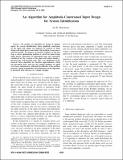An algorithm for amplitude-constrained input design for system identification
Author(s)
Manchester, Ian R.
DownloadManchester-2009-An algorithm for amplitude-constrained input design for system identification.pdf (471.8Kb)
PUBLISHER_POLICY
Publisher Policy
Article is made available in accordance with the publisher's policy and may be subject to US copyright law. Please refer to the publisher's site for terms of use.
Terms of use
Metadata
Show full item recordAbstract
We propose an algorithm for design of optimal inputs for system identification when amplitude constraints on the input and output are imposed. In contrast to input design with signal power constraints, this problem is non-convex and non-smooth. We propose an iterative solution: in the first step, a convex optimization problem is solved for input design under power constraints. In subsequent steps, the constraints considered are the p-norms of the input and output signals, p increases for each iteration step. This is an adaptation of the classical Poà ¿lya algorithm for function approximation, which has previously been used for the related problem of signal crest-factor optimization. Although the difficulty of the problem prevents a proof of optimality, the performance of the algorithm is discussed with reference to a simple example.
Date issued
2010-01Department
Massachusetts Institute of Technology. Computer Science and Artificial Intelligence LaboratoryJournal
Proceedings of the 48th IEEE Conference on Decision and Control, 2009 held jointly with the 2009 28th Chinese Control Conference. CDC/CCC 2009.
Publisher
Institute of Electrical and Electronics Engineers
Citation
Manchester, I.R. “An algorithm for amplitude-constrained input design for system identification.” Decision and Control, 2009 held jointly with the 2009 28th Chinese Control Conference. CDC/CCC 2009. Proceedings of the 48th IEEE Conference on. 2009. 1551-1556. © Copyright 2010 IEEE
Version: Final published version
Other identifiers
INSPEC Accession Number: 11148206
ISBN
978-1-4244-3871-6
ISSN
0191-2216